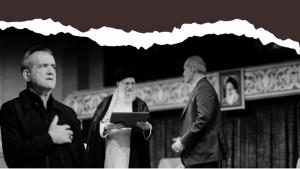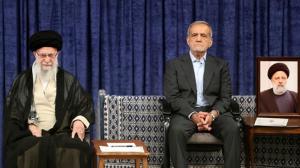(Video) Internal Tensions and Security Concerns in Iran Amid High-Profile Assassinations
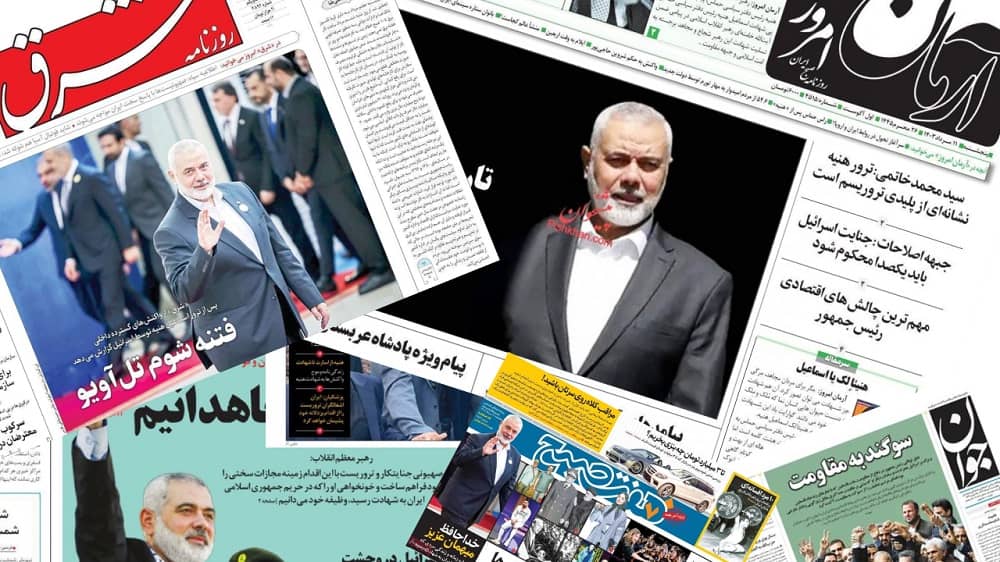
In the wake of the recent assassinations of Ismail Haniyeh, the political leader of Hamas, and Fouad Shukr, a senior commander of Hezbollah, security concerns have escalated within the Iranian regime, sparking intense internal disputes among media outlets in Tehran.
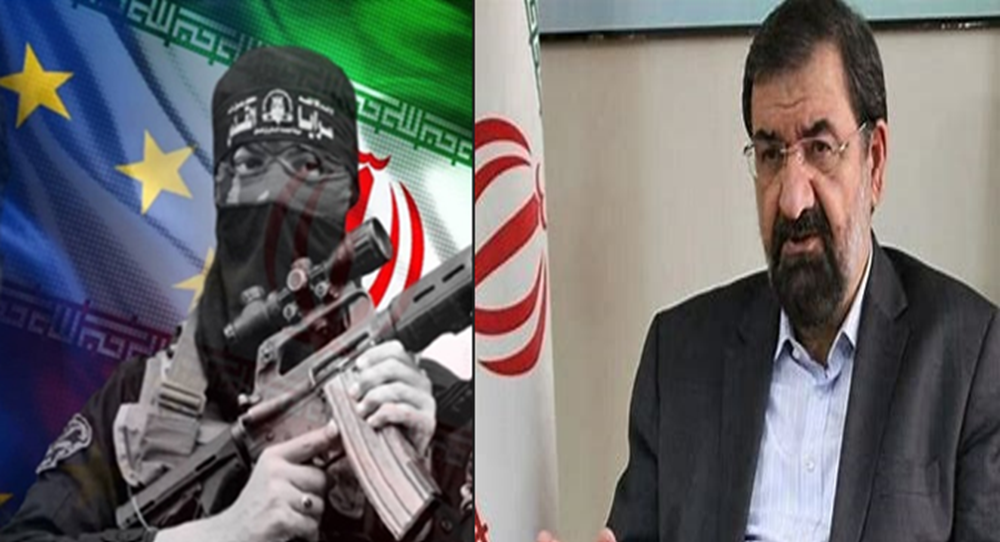
A Telegram channel associated with the Revolutionary Guards reposted a speech by Mohsen Rezaee, a former Islamic Revolutionary Guards Corps (IRGC) commander, highlighting multiple security breaches in the past year, including two explosions and an assassination.
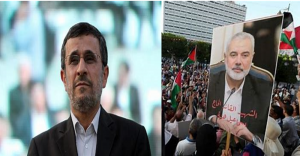
The espionage within the highest echelons of intelligence.“Is it a simple matter that the top person responsible for countering Israeli espionage turns out to be an Israeli spy? This is no joke," Ahmadinejad called for an investigation to uncover the network of spies.
Khabar Online, "Who has access to Haniyeh’s movements? This needs investigation, and we must not ignore the roles of internal infiltrators and traitors.”
On August 1, the state-run newspaper Jomhouri Eslami highlighted the infiltration issues, suggesting that the assassination of Haniyeh could be attributed to internal espionage. “The primary harm is the existence of infiltrators within our ranks. The fact that Israel can launch a missile into a heavily guarded area in Tehran indicates internal espionage. We must undertake a thorough purge of our intelligence and security sectors,” the newspaper stated, referring to internal spies as “Iranian Eli Cohens.”
Similarly, Khabar Online raised the alarm, writing, “We must not overlook the discussion of spies in sensitive institutions. Who had access to Haniyeh’s movements and rest times? This needs investigation, and we must not ignore the roles of internal infiltrators and traitors.”
The state-run newspaper Ham-Mihan wrote on August 1, “It is still unclear how this assassination occurred. Reports indicate that a projectile struck. This projectile must have been fired from either an aircraft or a platform. Various possibilities are being considered for the source of the firing, each of which is more concerning than the other.”
“In any of these scenarios, the defense system is called into question,” the source added. “Such attacks typically rely on receiving a precise signal from the target, or a human factor or technical component must be involved. The precise targeting of Haniyeh’s room does not bode well for positive news.”
Old wounds opened
The regime’s media outlets have also been circulating clips and statements from former intelligence officials, emphasizing the depth of internal infiltration. “Ruydad 24” replayed a speech by Ali Younesi, a former intelligence minister, from July 2021, where he lamented the extensive infiltration over the past decade. “The Mossad’s infiltration in various sectors has reached a level that all officials should be concerned for their lives.
During my time, such penetrations were unheard of,” Younesi noted, attributing the rise of espionage to internal rivalries and the creation of parallel intelligence organizations.
A Telegram channel associated with the Revolutionary Guards reposted a speech by Mohsen Rezaee, a former Islamic Revolutionary Guards Corps (IRGC) commander, highlighting multiple security breaches in the past year, including two explosions and an assassination.
“There is widespread security contamination. Less than a year saw three significant security events. Before this, there was a theft of our highly classified nuclear documents,” Rezaee had stated.
Former President Mahmoud Ahmadinejad’s remarks were also highlighted by the “Tahkim Vahdat” Telegram channel, where he questioned the espionage within the highest echelons of intelligence. “Is it a simple matter that the top person responsible for countering Israeli espionage turns out to be an Israeli spy? This is no joke,” Ahmadinejad had asserted, calling for a thorough investigation to uncover the network of spies.
The assassination of Ismail Haniyeh has not only stirred security concerns but also fueled political complexities.
Mohsen Mirdamadi, a former member of the regime’s parliament, wrote, “The shocking assassination of Ismail Haniyeh was painful and demands a response. The most effective and forceful response to Israel is to identify and cut off the infiltrators who have penetrated deep into the system. These infiltrators are among those whose cries of ‘Death to Israel’ can be heard to Tel Aviv.”
Ahmad Zeidabadi, a regime-affiliated media activist, described the situation as “complicated and dire,” indicating the difficult choices ahead regarding the ongoing conflict with Israel. “The Gaza war has turned into a confrontation between Hezbollah and Israel, with Iran indirectly involved. Continuing this war is very costly, and ending it is equally challenging,” he wrote on X.
Ali Rabiee, a former intelligence deputy, commented on the impact of Haniyeh’s assassination during Pezeshkian’s inauguration, calling it a “cursed strike against Iran’s electoral dignity.” The official IRGC news outlet, Sabereen News, suggested that the timing and location of the assassination, soon after the new president’s inauguration, aimed to undermine the regime’s intelligence capabilities.
On the other hand, the clerical regime has not overlooked the significant internal threat, and officials and state media have been warning about the potential consequences. As always, they desperately try to attribute their fear of the social roots of the Iranian Resistance to foreign countries.
The domestic threat effect
The Tasnim News Agency warned, “The hypocrites [the regime’s pejorative to defame the People’s Mojahedin Organization] have started spreading rumors and lies to shift the focus of condemnation away from the Zionists and bring verbal conflicts into the country.
To this end, several fake accounts with a revolutionary appearance are criticizing Mr. Pezeshkian’s government or primarily focusing on intensifying rumors within the country and calling for revenge against revolutionary institutions.”
The Mashregh News website, affiliated with the IRGC’s intelligence organization, wrote, “These claims are being made under the guise of seemingly revolutionary accounts but are, in reality, backed by [the MEK]. One of the MEK’s tactics during the imposed war [war with Iraq] was using psychological warfare tools for social influence.
Some social media accounts are systematically and in a coordinated manner shifting the media focus on Persian Twitter to condemn the newly established government. These accounts, with a revolutionary appearance but under direct or indirect control and organization by the MEK, have been spreading a common phrase:
On the first day of Pezeshkian’s government, Ismail Haniyeh was assassinated.’ Unfortunately, some domestic accounts have been influenced by these messages and have reposted them. For this reason, the Attorney General’s Office issued a statement urging media and virtual activists to avoid discussing topics that could disrupt the psychological security of society.”
On July 30, Iranian regime president Massoud Pezeshkian, in his inauguration ceremony at the Majlis (parliament), in addition to signing the pledge document, repeatedly emphasized the implementation of regime Supreme Leader Ali Khamenei’s programs in his speech.
Like his endorsement ceremony, he began his remarks with praise for Regime founder Ruhollah Khomeini, former IRGC Quds force commander Qassem Soleimani, and former regime president Ebrahim Raisi, and emphasized “pursuing the policies dictated by Khamenei.” He also repeatedly affirmed his commitment to the regime’s constitution and the vision document crafted by Khamenei.
Khamenei, both in the endorsement decree and in his speech at Pezeshkian’s endorsement ceremony, gave him numerous instructions summarized in one word: subservience. And that according to Raisi’s model. Khamenei’s appointees also constantly warned the new president of the regime not to overstep his bounds. They advised him to focus on economic issues and avoid creating trouble by engaging in cultural matters like hijab and internet censorship.
In foreign policy, Pezeshkian also followed Khamenei’s lead and the policy of using Palestine as a spearhead to carry out the regime’s policies in the region, chanting the desired slogans of the Supreme Leader and, in Khamenei’s style, using it as a bulwark to respond to the human rights condemnations against the regime.
These statements garnered the approval of the regime’s parliament speaker, Mohammad Bagher Ghalibaf, who also reminded the parliament that support for Pezeshkian’s government was conditional upon adherence to these principles.
Pezeshkian’s bowing and declarations of subservience to the Supreme Leader and all the dictated lines and orders of the regime’s constitution come as some of his supporters remind him of the fate of previous subservient presidents.
On July 29, in an article, the Jahan-e Sanat news website referred to “problems and crises that have reached the brink of explosion… and have put the system’s ship at risk of grounding and sinking.” Then, in a tone of advice and solution-seeking to the president, the article says:
“He should undertake a fundamental and life-saving surgery in the way of managing the country’s affairs domestically and internationally and remove the barriers that have been created over the years in the way of the country’s relations with the outside world. He should end the long-standing, costly, and back-breaking isolation that the country has fallen into because, without this, any promises made to the people about solving economic problems will find the least guarantee of implementation.”
The article then reminds Pezeshkian that “he will have no more than two paths ahead.” One path is “to find a way to overcome the obstacles and roadblocks of the constitution in a not-too-long period by resorting to various methods and experiences he has gained from the countless weaknesses in the way of managing the country during his long years as a parliament representative.”
The second path is that if he sees that “he is getting nowhere and is beating a dead horse, he should declare his inability to overcome the structural and constitutional obstacles and, with the permission of the regime’s leadership and other main decision-making authorities, return to the sacred profession of medicine.”
The author of this article has not heard Pezeshkian’s oath of subservience to these very “structural and constitutional obstacles” and does not know that the new regime president has said nine times out of ten that his candidacy in the election show was “to preserve the regime” and, with heartfelt belief and practical commitment to Khamenei, he was approved and became the regime’s president.
The new handyman of the state is not at a crossroads; in the quagmire of subservience, there is no path but sinking to the depths of the swamp.
If you wish to receive the NCRI weekly Newsletter, please use the following link to subscribe: https://bit.ly/3SMgEla.
Shahin Gobadi
NCRI
+33 6 61 65 32 31
email us here
Mohsen Mirdamadi, a former member of the regime’s parliament, wrote, “The shocking assassination of Ismail Haniyeh was painful and demands a response."
Legal Disclaimer:
EIN Presswire provides this news content "as is" without warranty of any kind. We do not accept any responsibility or liability for the accuracy, content, images, videos, licenses, completeness, legality, or reliability of the information contained in this article. If you have any complaints or copyright issues related to this article, kindly contact the author above.

